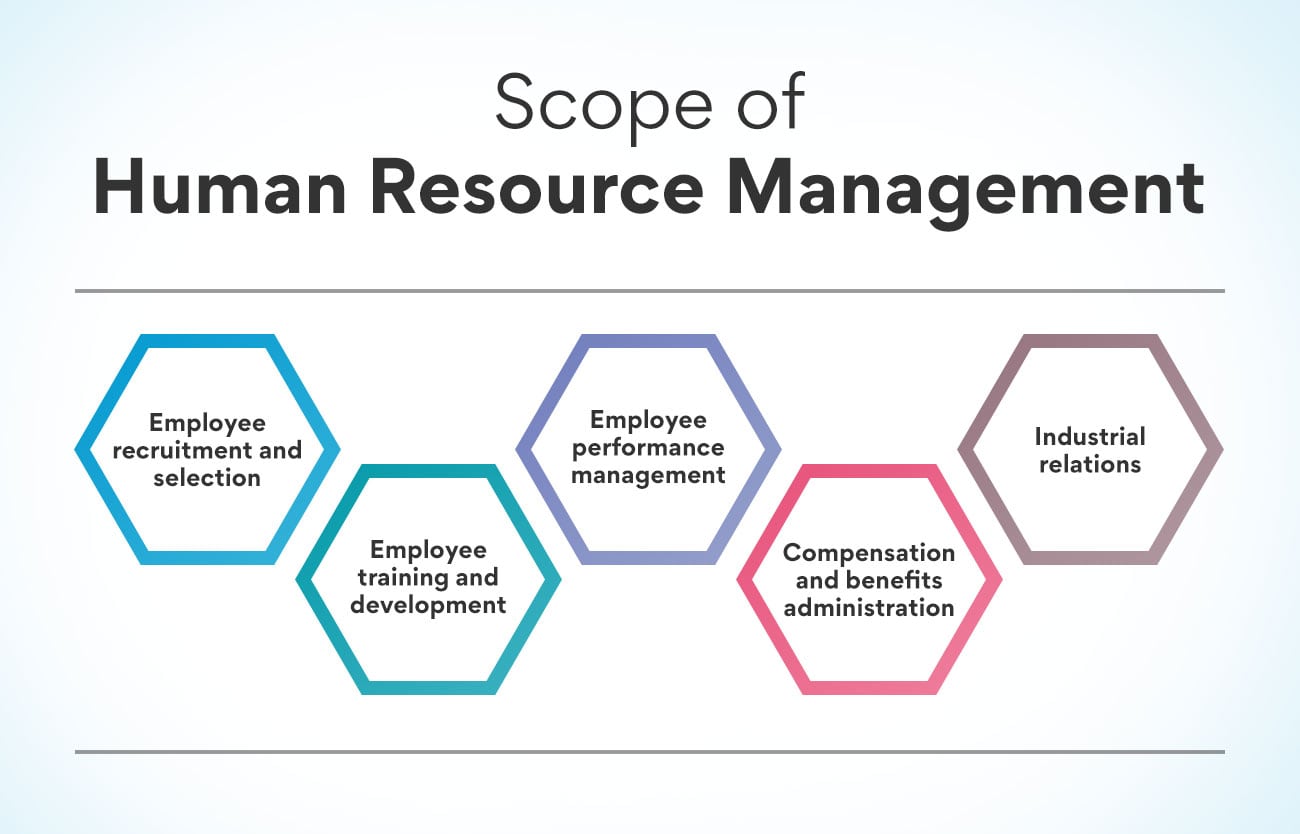Introduction to Scope of Human Resource Management (HRM)
The Scope of Human Resource Management (HRM) is the strategic and systematic approach to managing an organization’s workforce. It involves the coordination of various functions to ensure that employees contribute effectively to the overall success of the company.
Understanding the Nature of HRM:
The nature of HRM is dynamic, encompassing both strategic and operational elements. It goes beyond administrative tasks, focusing on strategic planning to align human resources with the organization’s long-term goals. HRM is fundamentally people-centric, prioritizing employee development and well-being.
Exploring the Scope of HRM:
The scope of HRM is extensive, covering various functions crucial for organizational effectiveness. From assessing company human resources to managing employee grievances and engaging with labor unions, HRM ensures the efficient utilization and motivation of the workforce. This section will delve deeper into each aspect, providing insights into the multifaceted nature of HRM.
10 Best Key Components of HRM Scope

1. Assessing Company Human Resources:
Effective HRM begins with a thorough assessment of a company’s Scope of Human Resource Management. This involves analyzing the skills, capabilities, and potential of the existing workforce to align them with organizational goals. Understanding the workforce’s composition enables HR professionals to make informed decisions regarding recruitment, training, and performance management.
2. Strategic Employee Recruitment and Selection:
HRM plays a pivotal role in attracting and selecting the right candidates to meet organizational needs. This involves strategic planning to identify the skills and qualities required for specific roles. Through a targeted recruitment process, HR professionals ensure that the organization welcomes individuals who not only possess the necessary qualifications but also align with its values and culture.
3. Job Review and Role Refinement:
Reviewing jobs within the organization is a continuous process in HRM. It involves evaluating and refining job roles to ensure they align with the company’s objectives. This process helps in optimizing organizational structure, ensuring that each role contributes effectively to the overall success of the company.
4. Training and Development Initiatives:
HRM focuses on enhancing the skills and knowledge of employees through systematic training and development initiatives. By identifying areas for improvement and providing relevant training programs, HR professionals contribute to the continuous growth of the workforce. This not only benefits individual employees but also strengthens the overall capabilities of the organization.
5. Performance Management Strategies:
Performance management is a critical aspect of HRM, involving the regular evaluation and recognition of employee performance. This process aims to identify strengths, address weaknesses, and motivate employees to achieve their full potential. Effective performance management contributes to a culture of accountability and continuous improvement within the organization.
6. Compensation and Benefits Management:
HRM is responsible for designing and managing fair and competitive compensation and benefits packages. This involves ensuring that employees are rewarded appropriately for their contributions and that the organization remains competitive in attracting and retaining top talent.
7. Employee Relations and Engagement:
Cultivating positive employee relations and engagement is a key focus of HRM. By fostering effective communication, addressing concerns, and creating a supportive work environment, HR professionals contribute to a motivated and engaged workforce. This positively impacts productivity and employee satisfaction.
8. Ensuring Health and Safety:
HRM is instrumental in ensuring a safe and healthy workplace environment. This involves implementing policies and procedures to protect employees’ well-being, addressing safety concerns, and promoting a culture of health and wellness within the organization.
9. HR Information Management:
Utilizing technology to manage and streamline HR-related data and information is an integral part of HRM. HR information management systems help in organizing and accessing crucial employee data, facilitating efficient HR processes and decision-making.
10. Employee Grievance Redressal System:
HRM oversees the establishment and management of an effective employee grievance redressal system. This involves addressing and resolving employee concerns promptly and fairly to maintain a harmonious workplace environment.
This section provides an overview of the diverse components that constitute the scope of HRM, showcasing its comprehensive approach to managing and optimizing the Scope of Human Resource Management within an organization.
Interactions and Relations in HRM
Understanding Labour and Trade Unions
HRM involves navigating relationships with labor and trade unions. This includes engaging in negotiations, addressing concerns, and fostering collaborative partnerships. Understanding the dynamics of these interactions is crucial for maintaining harmonious employer-employee relationships.
Responsibilities of HR Professionals

Ensuring Legal Compliance and Ethical Standards
HR professionals play a pivotal role in ensuring that HR practices align with legal requirements and ethical standards. This involves staying abreast of relevant laws, regulations, and industry standards to mitigate legal risks and maintain ethical conduct within the organization.
Fostering a Positive Workplace Culture
Creating and nurturing a positive workplace culture is a core responsibility of HR professionals. This involves promoting diversity and inclusion, encouraging teamwork, and fostering an environment that values employee well-being. A positive culture contributes to employee satisfaction and organizational success.
Crisis and Change Management
HR professionals are essential in navigating crises and managing organizational change. Whether dealing with unexpected challenges or facilitating planned transitions, HRM strategies ensure a smooth and effective response to crises and support employees through periods of change.
This section highlights the interpersonal aspects of HRM, emphasizing the importance of effective communication, negotiation skills, and ethical conduct in managing relationships within and outside the organization. Additionally, it outlines the diverse responsibilities of HR professionals in maintaining legal compliance, fostering a positive culture, and managing crises and change.
Enhancing Career through an MBA in HRM
Overview of Manipal Academy of Higher Education’s MBA Program
Manipal Academy of Higher Education (MAHE) offers a specialized MBA program in the Scope of Human Resource Management. This program is designed to equip individuals with the skills and knowledge required to excel in the dynamic field of HRM.
Elevating Careers in the Scope of Human Resource Management
Pursuing an MBA in HRM from MAHE can significantly elevate one’s career in the Scope of Human Resource Management. The program provides a comprehensive understanding of HRM principles, strategic planning, and leadership skills necessary for success in the field.
This section aims to shed light on the educational opportunities available at Manipal Academy of Higher Education and how pursuing an MBA in HRM can enhance career prospects in the field of Scope of Human Resource Management.
Scope of Human Resource Management PDF
The PDF format serves as a common medium for disseminating information about the scope of Human Resource Management (HRM). A document in PDF form allows for easy sharing, printing, and viewing, making it a convenient resource for HR professionals, educators, and students seeking comprehensive insights into the various dimensions of HRM.
Scope of Human Resource Management PPT
Presentations (PPT) are an effective means to communicate complex concepts succinctly. The scope of Human Resource Management in a PowerPoint presentation provides a visually engaging overview, facilitating better understanding during training sessions, seminars, or academic lectures.
Scope of Human Resource Development
Human Resource Development (HRD) extends beyond HRM, focusing on enhancing employees’ skills, knowledge, and abilities. This broader perspective encompasses training, career development, and performance management, contributing to organizational growth and success.
Scope of Human Resource Management in Education
In the education sector, HRM plays a crucial role in managing faculty, staff, and administrative functions. This includes recruitment, professional development, and ensuring compliance with educational policies, thereby contributing to the overall effectiveness of educational institutions.
Importance of Human Resource Management
Recognizing the significance of HRM is pivotal for organizations aiming to maximize their human capital. From talent acquisition to employee engagement and strategic planning, HRM ensures that an organization’s workforce is aligned with its objectives, fostering sustained success.
Nature and Scope of Human Resource Management Includes
The nature and scope of HRM encompass strategic planning, organizational behavior, recruitment, training, performance management, and employee relations. This holistic approach ensures that HRM addresses various facets crucial for organizational effectiveness.
HR in Canada Salary
Understanding the salary landscape for Scope of Human Resource Management (HR) professionals in Canada is essential for those entering or progressing within the field. Factors such as experience, education, and the specific province can influence salary levels, providing valuable insights for career planning.
Career in HR in Canada
Exploring a career in HR in Canada involves understanding the diverse opportunities available across industries and provinces. From HR generalists to specialists in areas like recruitment or employee relations, Canada offers a dynamic landscape for HR professionals.
Best Province for HR Jobs in Canada
Identifying the best province for HR jobs in Canada requires consideration of job market trends, industry demands, and personal preferences. Provinces may differ in terms of economic activities and job opportunities, influencing the choice of location for HR professionals.
Is Human Resources a Good Career in Canada
Assessing the viability of the Scope of Human Resource Management as a career in Canada involves evaluating job prospects, industry growth, and personal aspirations. The field offers rewarding opportunities for those passionate about workforce management and organizational development.
2 Years Post Graduate Diploma in Human Resource Management in Canada
Pursuing a 2-year postgraduate diploma in Scope of Human Resource Management in Canada provides a focused and intensive educational experience. This program equips students with the necessary skills and knowledge for successful HR careers in the Canadian job market.

HR Jobs in Canada for Foreigners
Understanding the job market and opportunities for foreign HR professionals in Canada is crucial. Various industries and regions may have specific demands, and navigating the job search process requires knowledge of immigration regulations and industry requirements.
Highest Paying HR Jobs in Canada
Identifying the highest-paying HR jobs in Canada involves considering factors such as specialization, experience, and industry. Some HR roles, such as HR directors or compensation and benefits managers, may offer competitive salaries based on expertise.
How to Become HR in Canada
Becoming an HR professional in Canada involves educational qualifications, practical experience, and potentially obtaining professional certifications. Understanding the career path, networking, and staying updated on industry trends are key steps for success in the field.
Role of Human Capital in an Organization
Human capital, referring to the skills, knowledge, and abilities of an organization’s workforce, plays a central role in its success. Managing and optimizing human capital involves strategic HR practices to ensure employees contribute effectively to organizational goals.
Importance of Human Capital Management
Recognizing the importance of Human Capital Management (HCM) involves understanding its impact on organizational performance. HCM focuses on maximizing the value of human capital through effective recruitment, development, and retention strategies.
Aims of Human Capital Management
The aims of Human Capital Management include aligning workforce capabilities with organizational goals, fostering continuous learning, and creating a workplace culture that encourages innovation and adaptability. Achieving these aims contributes to organizational resilience and success.
Functions of Human Capital Management
Human Capital Management encompasses various functions, including workforce planning, talent acquisition, performance management, and employee development. These functions collectively contribute to optimizing the organization’s human capital for sustained growth.
Types of Human Capital Management
Different types of Human Capital Management models exist, each emphasizing specific aspects of workforce optimization. Models may focus on talent management, knowledge management, or strategic workforce planning, catering to the unique needs of organizations.
Scope of Human Resource Management in the UK for International Students
The scope of Human Resource Management in the UK for international students involves exploring educational opportunities, understanding cultural nuances, and gaining insights into the UK job market. This provides a comprehensive view for international students aspiring to study and work in the field.
List of Careers in Human Resources
Scope of Human Resource Management offers a diverse array of career paths, including HR generalist, recruiter, training and development specialist, and HR manager. Understanding these career options helps individuals tailor their professional journey based on their interests and strengths.
B.S. Human Resource Management Jobs
Graduates with a Bachelor of Science (B.S.) in Scope of Human Resource Management can pursue various entry-level roles such as HR assistant, recruiter, or benefits coordinator. Exploring job opportunities aligning with this degree ensures a smooth transition into the HR field.
Human Resource Management vs Organizational Behavior Wikipedia
Comparing the Scope of Human Resource Management and Organizational Behavior on Wikipedia provides an overview of these two fields. Understanding the distinctions helps individuals and students navigate academic and professional decisions related to these disciplines.
Human Resource Management vs Organizational Behavior PPT
A PowerPoint presentation comparing the Scope of Human Resource Management and Organizational Behavior offers a visual aid for comprehending the differences. This resource is beneficial for academic lectures, training sessions, or organizational presentations.
Human Resource Management vs Organizational Behavior PDF
A PDF document comparing the Scope of Human Resource Management and Organizational Behavior serves as a concise reference for individuals seeking a quick overview of the distinctions between these two disciplines. This resource is particularly useful for academic research and professional insights.
Conclusion
In conclusion, the scope of Human Resource Management (HRM) is vast and intricate, encompassing a myriad of functions that collectively contribute to organizational success. From assessing the Scope of Human Resource Management to managing employee relations and engagement, HRM plays a pivotal role in shaping a positive and effective workplace.
Significance of HRM in Organizational Success
The significance of HRM in organizational success cannot be overstated. By strategically aligning the Scope of Human Resource Management with business objectives, HR professionals ensure that the workforce remains motivated, skilled, and engaged, fostering a culture of continuous improvement.
This section serves as a summary, reaffirming the expansive scope and critical role of the Scope of Human Resource Management in driving organizational effectiveness and creating a conducive workplace environment. It emphasizes the essential contribution of HRM to an organization’s overall success and sustainability.



